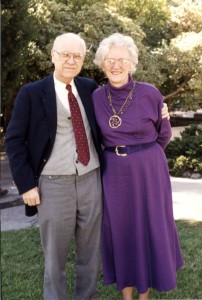There was an article in Christianity Today on January 21, 1983 entitled “Ralph Winter’s Mission Center Forges Ahead; Money Still Tight,” and the subtitle is “His ‘unreached people’ strategy seems to be taking hold among other missions.” Dr. Winter founded the U.S. Center for World Mission to focus on two primary activities: locating and determining how to reach the world’s hidden [or unreached] peoples and mobilizing Christians through information about them. This article discusses how Dr. Winter’s goal at the U.S. Center for World Mission was not only to raise funds for the purchase of the campus available to him and his staff in Pasadena, but to mobilize believers in churches all over the country to become excited about frontier missions and act to make a difference therein, the options being praying, giving and even going. His awareness raising reached churches and mission agencies alike. One bullet point example says, “Among denominations, the Evangelical Free church recently named a staff person to work full-time promoting frontier missions in its local churches. The International Church of the Foursquare Gospel has set a goal of contacting 100 unreached people groups by 1990.”
The U.S. Center additionally initiated the Frontier Fellowship, a group encouraging mission agencies and denominations to a daily prayer and giving discipline, hoping to involve one million people by the end of 1983. If each person were to give daily loose change to frontier missions, and the author figures this to amount to 28 cents per individual, the plan would produce $100 per year per person, meaning $100 million each year. Donors are requested to designate $15 for the U.S. Center, which would take care of the $10 million owed on the campus at this point. The remainder would be for frontier missions programs of the various agencies. The Frontier Fellowship began publishing a Daily Prayer Guide at this time, which had 20,000 subscribers, and fifteen organizations were part of this fellowship, a few being the Africa Inland Mission, the World Evangelical Fellowship and a United Presbyterian group.
Dr. Winter promoted a lifestyle he called the “wartime lifestyle” that emphasized saving money and living frugally when possible. The U.S. Center relied heavily on volunteer workers, including Dr. Winter’s father Hugo Winter, a retired engineer who volunteered one day per week. The author writes, “Staff receive missionary salaries based on need, so that Winter receives no more than the newest staff member. He’s usually seen wearing the same blue sport coat and driving to work in a 1965 station wagon on its third 100,000-mile cycle.” Winter’s original plan to pay for the campus was to raise the $15 million through one million gifts of $15 each. This would involve a large number of people in frontier missions while not diverting money away from churches and other mission agencies. However, Winter ended up needing to give in to receiving large gifts from individuals and organizations to save the campus from foreclosure. Yet he was committed to reassigning gifts over $15 to other agencies, and sizeable gifts from churches and organizations were to be paid back as soon as enough gifts of $15 a piece came in as a result of the Frontier Fellowship plan.



